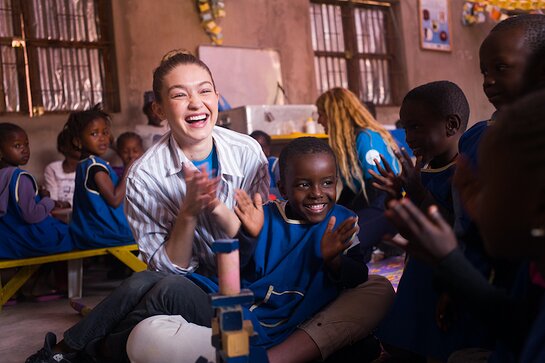Gigi Hadid, international supermodel and UNICEF Supporter, travelled to Senegal last week to see first-hand the work that UNICEF does in the hardest to reach parts of the world.

Credit/Copyright: Vincent Tremeau for UNICEF USA
The visit focused on UNICEF’s core programmatic areas including protection, adolescent empowerment, education and water, sanitation and hygiene (WASH).
In Dakar, Hadid visited La Maison Rose, a UNICEF-supported shelter for girls and women in need of safety. La Maison Rose is an open shelter and home to UNICEF’s Rapid Protection program that enables community members trained in child protection to report cases of violence via a 24/7 SMS system and deploy assistance to victims within 5 minutes.
She then travelled to Kolda, a city in the south of Senegal, to visit pre- and primary schools where UNICEF is working to combat drop-out rates both in the city and in surrounding villages. Though 70 percent of Senegalese children start school, 1 in 4 children leave after just a few years because of poverty, geographic accessibility, child labor, early marriages and failing infrastructures. Hadid learned about UNICEF’s efforts to increase access to community pre-schools, improve primary school teachers’ trainings and prevent violence in schools and at home.
In the same region, Hadid visited a maternal and child health center. Society first acknowledges a child’s existence and identity through birth registration, which is a critical step in ensuring accessibility to exercise all rights. In Senegal, 1 in 4 children are not registered for birth certificates, which creates obstacles for them to receive health care, education and protective services. In order to increase the registration rate, UNICEF Senegal supports the government in establishing pre- and post-natal protocol, setting up birth registration desks at hospitals and birthing centers. UNICEF Senegal also helps to provide birth certificates, registration books, handwashing stations and training to the village chiefs who encourage women to give birth in the health center rather than in their villages.
This past July, UNICEF piloted a digital skills bootcamp at the youth center in Kolda, aimed at empowering teenage girls by providing them with skills in digital technologies, innovation and entrepreneurship. The program also pairs the young women with mentors from a local university to continue their learnings and mentorship outside of the bootcamp. The participants from the program shared inspirational stories as they showed Hadid their latest projects in coding, robotics, media and digital production.
“The young women I met at the youth center reminded me that the most powerful tool we all have is our voice,” said Hadid. “Whether we are asking for help or using it to spread awareness, one voice, one story, can change the lives of many.”
To cap her learnings on some of UNICEF’s core programming, Hadid visited a village on the Guinea-Biassu border that has successfully completed the Community Lead Total Sanitation program. She met with village leaders and families to learn about their participation in the hygiene and sanitation initiative. This local, government and UNICEF collaboration empowers villages to take direct ownership in bringing latrines, hand washing stands and household water purification methods to their communities.
“Having travelled through Senegal to reach the town of Kolda, I was able to further understand the work that UNICEF is doing each and every day across the globe. Even in the hardest to reach places, UNICEF is using innovation, technology and community-led interventions to give every child the opportunity to thrive,” said Hadid.
The visit falls during UNICEF’s end of year campaign where Hadid, along with Ambassadors and Supporters Alyssa Milano, Halima Aden, Jenna Bush Hager, Pink, Sofia Carson and Tea Leoni, have come together to support UNICEF’s work for every child.





